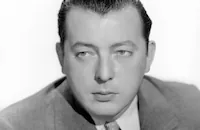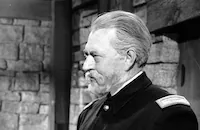Pork Chop Hill

Brief Synopsis
Cast & Crew
Lewis Milestone
Gregory Peck
Harry Guardino
Rip Torn
George Peppard
Carl Benton Reid
Film Details
Technical Specs

Synopsis
In 1953 at Panmunjom, Korea, a conference between American and Communist forces convenes to discuss halting their three-year conflict. Meanwhile an area in the neutral zone, dubbed Pork Chop Hill by the Americans, is retaken by the Chinese at the cost of the entire American infantry company. Soon after, "K" Company commander Lt. Joe Clemons meets with division commander Col. Davis to receive orders to retake the area and is assured that "L" Company will protect Clemons' flank. Knowing that Pork Chop Hill holds no strategic value, Clemons surmises to friend and co-commander Lt. Suki Ohashi that the action will underscore the Americans' strength while the peace negotiations continue. Clemons divides the company into three platoons, leading the first, placing Ohashi in command of the second and holding the third in reserve. As the two platoons ascend the hill at dusk, American artillery bombards the crest but the men are nevertheless unnerved to hear a Chinese broadcaster in the central command bunker calmly call out criticism of their foolhardiness and list statistics of American losses. Unknown to Clemons, back at division headquarters, Davis learns that "L" Company has been delayed getting into position because they have misconstrued their orders to provide support for Clemons' company. Once the American shelling stops, Clemons' men fall under an increasingly heavy enemy barrage and the soldiers are then shocked when bright spotlights from their own position abruptly shine down upon them, escalating enemy fire. The lights go off, and moments later, the radio man informs Clemons they have received an apology from the American group responsible for the spotlights who mistook their location for another. At dawn, still some distance from the trenches and with his platoon severely depleted, Clemons is unable to rouse Ohashi on the radio and sends a messenger in search of the second platoon. Meanwhile, Clemons' men are startled to hear the sound of trumpets blaring, heralding a ferocious assault by the Chinese. When the fighting slows, Clemons finally reaches Ohashi by radio and demands assistance, but Ohashi reports he has lost a quarter of his men and cannot hold his position near the crest if he divides them. Dismayed by the lack of promised support along the hill's left flank, Clemons orders a small squad to provide machine gun cover there. Later, when the nearly decimated squad returns to report to Clemons, he contacts Davis to complain bitterly about the lack of assistance. Davis insists that the crest be taken as soon as possible and ignores Clemons' protest that he has too few men to accomplish the task. Ohashi reports that he has lost nearly half of his platoon and requests the third platoon be activated, but Clemons believes they should be held in reserve as long as possible. Disheartened, Ohashi nevertheless agrees and returns to maintain his position as Clemons is joined by a handful of soldiers dashing up the hill. Clemons is stunned to learn the twelve men are the only survivors from "L" Company, whose two platoons were slaughtered in their attempt to provide delayed assistance to "K" Company. The remainder of Clemons' platoon, joined by the additional men, then rush the next line of trenches and bunker and are relived to find it has already been secured by Ohashi's men. While the soldiers greet one another, the bunker is suddenly hit by numerous artillery shells. Although severely shaken, most of the men survive and angrily insist the shells came from their own side. Realizing the exhausted, demoralized men are correct, and fearing a revolt, Clemons lies, countering that the artillery came from a nearby, Chinese-held mountain. Anxious over the long silence from Davis, Clemons meets with Ohashi to decide upon their next action. Clemons summons Lt. Waldorf and the third platoon and declares the crest must be taken to avoid the continued attrition of the remaining American forces. Knowing that Waldorf is inexperienced, Ohashi volunteers his men to make a risky bayonet charge against the crest. Clemons promises a diversionary action as well as support and the move is successful. Afterward, Clemons radios Davis' headquarters, which have now come under an intensive enemy barrage. Cut off after hearing Pork Chop Hill has been taken at last, Davis is unaware of Clemons' desperate plea for supplies and ammunition. Soon after, "K" Company's last radio is destroyed, but Clemons is pleased by the arrival of his brother-in-law, Lt. Walt Russell, commander of "G" Company. The men's reunion is short-lived, however, when Russell reveals he has been assigned to perform a "mop-up" action and not to reinforce "K" Company. Russell is horrified to learn Clemons and Ohashi have only thirty-five men left from their entire company. Moments later, a messenger arrives with news from Davis that "G" Company has been recalled, as Davis believes the hill secured. Clemons sends a terse return message insisting that without Russell's men, the area cannot be held. At division headquarters, Gen. Trudeau demands to know whether his superiors intend to hold the hill, but nevertheless supports the recall of "G" Company. Russell departs, taking Clemons' wounded and leaving as much ammunition as possible. Clemons orders his twenty-five remaining men to spread out along the crest as the Chinese radio broadcaster informs the Americans they have forty-five minutes to surrender or they will be destroyed. Using the radio left by Russell, Clemons contacts Davis to declare that unless they are provided reinforcements, they must withdraw, but Davis responds that he has received no further orders. At the Panmunjom peace conference, the American representative angrily concludes that the Chinese refusal to give up the strategically useless Pork Chop Hill serves as a test of American character, and contacts American Infantry Division headquarters. As the Chinese begin their final assault on Clemons' position, Ohashi is wounded bringing Clemons a report that "L" Company's surviving platoon is providing support. The strength of the Chinese attack forces the Americans into bunkers that they frantically seal against enemy flamethrowers. The tide then abruptly turns when a reinforcement division arrives to clinch the taking of Pork Chop Hill.

Director

Lewis Milestone
Cast

Gregory Peck

Harry Guardino

Rip Torn

George Peppard

Carl Benton Reid

James Edwards

Bob Steele

Woody Strode
George Shibata

Norman Fell
Lew Gallo

Robert Blake
Cliff Ketchum
Biff Elliot
Charles Aidman
Barry Atwater
Viraj Amonsin
Michael Garth
Leonard Graves

Martin Landau
Ken Lynch
Paul Comi
Syl Lamont
Abel Fernandez
Kevin Hagen
Chuck Hayward
John Alderman
Gavin Mcleod
John Mckee
Bert Remsen
Robert Williams
Buzz Martin

Bill Wellman Jr.

Dean Stanton
Barry Maguire
Crew
Tom Andre
Eddie Armand
Sy Bartlett
Carl Benoit
George Boemler
Edward G. Boyle
Byron Chudnow
Capt. Joseph G. Clemons Jr.
Earl Crain Sr.
Edwin Dupar
John Franco
Ray Gosnell
Dan Greenway
Del Harris
Roger Heman
David Koehler
Sam Leavitt
Gregory Peck
Frank Prehoda
Nicolai Remisoff
Leonard Rosenman
Stan Smith
Lynn Stalmaster
Nate Watt
James R. Webb

Videos
Movie Clip





Hosted Intro
Film Details
Technical Specs

Articles
Pork Chop Hill
Milestone had a long association with war, having enlisted in the US Army in 1917 during WWI. He was assigned to the photographic unit of the Signal Corps, where he learned about filmmaking by assisting on military shoots and the assembly of combat footage. After being discharged, Milestone headed to Hollywood in 1919 and eventually directed his first film in 1925. But it was Milestone's direction of the landmark anti-war drama about the First World War, All Quiet on the Western Front (1930), that emotionally moved both crowds and critics. He would later turn his attention to the spectacle of war and the cohesiveness of men in battle in both A Walk in the Sun (1945) and Pork Chop Hill, which form an informal war trilogy with All Quiet on the Western Front.
The release version of Pork Chop Hill differed from Milestone's original conception. The film originally was to cut between the peace talks and the action of holding the hill but that idea was scrapped. Nevertheless, Pork Chop Hill was still cut by nearly twenty minutes, supposedly because the wife of star Gregory Peck felt that her husband made his first entrance too late into the picture. While that claim stands as unconfirmed, the film does show signs of post-production editing, with segments of several excised scenes showing up under the main title credits.
Collectors of movie trivia should know that William Wellman, Jr., the son of legendary director, William Wellman (Wings, 1927), and a familiar face in sixties drive-in fare like Born Losers (1967) and Winter-A-Go-Go (1965), has a small role as "Iron Man." Barry McGuire, the former lead singer of The New Christy Minstrels, also turns up as a minor character named Lt. Attridge. McGuire would go on to score a number one hit with the protest song, "Eve of Destruction," and then abandon the pop music scene for a career in Christian music.
Director: Lewis Milestone
Producer: Sy Bartlett
Screenplay: James R. Webb
Cinematography: Sam Leavitt
Editor: George Boemler
Music: Leonard Rosenman
Cast: Gregory Peck (Lt. Joe Clemons), Harry Guardino (Pvt. Forstman), Rip Torn (Lt. Walter Russell), George Peppard (Cpl. Chuck Fedderson), Carl Benton Reid (American Admiral at Peace Conference).
BW-98m. Letterboxed.
by Scott McGee

Pork Chop Hill
Quotes
Trivia
Notes
The following written prologue appears in the onscreen credits: "This is a true story, based on the book by Brig. Gen. S. L. A. Marshall, USAR. In most cases not even the names of the people have been changed. We are deeply grateful for the cooperation of the United States Army." As noted in the prologue, the incidents within the film were based on an actual April 1953 battle that raged while peace negotiations were being held. Capt. Joseph G. Clemons, Jr., upon whom Gregory Peck's character was based, served as the film's technical advisor. Hollywood Reporter production charts add Rudy Duran to the cast, but his appearance in the final film has not been confirmed. According to the Filmfacts review, the picture was filmed partially on location in California's San Fernando Valley. Pork Chop Hill marked the feature film debut of actor Martin Landau.
The Variety review took issue with the film for presenting African-American actor Woody Strode as a would-be deserter who also threatens to kill "Lt. Joe Clemons." The review stated: "It's amazing that [screenwriter James R.] Webb should have chosen a Negro to be featured in this incident. It could have been a white man, and the effect would have been the same. The producers of the picture surely are aware that the tendency to generalize where a Negro is involved is far greater, and more harmful." The reviewer did not mention that James Edwards, also African-American, appears in a supporting role as a dutiful soldier ordered by Clemons to "keep an eye on" Strode's character. Another, unidentified African-American actor also appears in numerous scenes as a soldier performing his duty. The Korean War (1950-1953) was the first war in which African Americans were integrated into the regular Army.

Miscellaneous Notes
Released in United States on Video April 1988
Released in United States Winter January 1, 1959
Released in United States Winter January 1, 1959
Released in United States on Video April 1988














